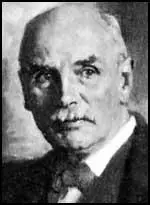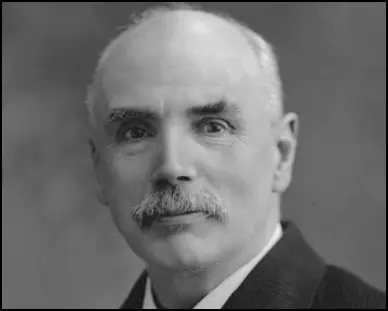George Barnes

George Barnes was born at Lochee near Dundee on 2nd January 1859. His father, James Barnes, was a mechanic at a local textile mill but in 1866 the family moved to Liverpool and the following year settled in London.
George attended Enfield Church School for two years but at the age of eleven began work at a jute mill. In 1872 the Barnes family returned to Dundee and George found work at Parker's Foundry. When George completed his apprenticeship he moved to Barrow-in-Furness where he found work in the town's shipyard.
Unhappy with his wages of £3 a week, Barnes moved to London in 1879. After ten weeks unemployment he found temporary work and eventually obtained work constructing the Albert Dock in the Thames. Barnes was a maintenance engineer and gradually improved his skills by attending classes in engineering drawing and machine construction at Woolwich Arsenal.
In 1882 Barnes obtained better work at the Lucas & Airds in Fulham. Barnes joined the Amalgamated Society of Engineers (ASE) where he met Tom Mann and John Burns. Barnes attended meetings of the Social Democratic Federation and the Socialist League, but rejected the idea of socialist revolution and refused to join either organisation.
On the 13th February, 1887 Barnes attended the demonstration in Trafalgar Square that turned into the riot known as Bloody Sunday. Barnes was badly injured when he was trampled on by a police horse. However, two of his friends, John Burns and Robert Cunninghame Graham, were arrested and later sentenced to a six-week prison sentence.
In 1889 George Barnes was elected to the executive of the Amalgamated Society of Engineers. He supported the election of John Burns as general secretary of the union in 1890. Two years later Barnes was appointed as assistant general secretary.
Barnes worked closely with other socialist trade unionists and in 1893 joined with Keir Hardie, Robert Smillie, Tom Mann, John Glasier, H. H. Champion and Ben Tillett to form the Independent Labour Party (ILP). In the 1895 General Election the ILP put up 28 candidates but won only 44,325 votes. All the candidates were defeated, including George Barnes at Rochdale.
In 1896 Barnes became a full-time union official when he was elected as General Secretary of the Amalgamated Society of Engineers. The ASE was now Britain third largest union and Barnes was one of the country's most powerful labour leaders. In July 1897 Barnes led the ASE in a long strike in an attempt to win an eight-hour day. The strike ended in January 1898 without this being achieved, but one success was the acceptance by the Employers Federation that it was willing to negotiate wages and conditions with the ASE.
Barnes went on a fact-finding mission in Europe in 1898. Although the trip convinced Barnes that British engineers were the best in Europe, he also discovered that Britain was falling behind other industrial nations in wage levels and working conditions. Barnes became convinced that real progress would only be made when more trade unionists were elected to the House of Commons.
Keir Hardie, the leader of the Independent Labour Party and George Bernard Shaw of the Fabian Society, believed that for socialists to win seats in parliamentary elections, it would be necessary to form a new party made up of various left-wing groups. On 27th February 1900, Barnes attended the meeting at the Congregational Memorial Hall in Farringdon Street, to discuss the future of the labour movement in Britain. Representatives of all the socialist groups in Britain and trade union leaders took part in the discussions. After a debate the 129 delegates decided to pass Hardie's motion to establish "a distinct Labour group in Parliament, who shall have their own whips, and agree upon their policy, which must embrace a readiness to cooperate with any party which for the time being may be engaged in promoting legislation in the direct interests of labour."
To make this possible the Conference established a Labour Representation Committee (LRC). This committee included two members from the Independent Labour Party, two from the Social Democratic Federation, one member of the Fabian Society, and seven trade unionists. Barnes made a speech at the meeting arguing that not only working class men should be selected as LRC candidates in elections. He made the point that people like Frederic Harrison and Sidney Webb had important qualities to contribute to the labour movement. Barnes' motion was passed by 102 to 3.
In 1902 George Barnes formed the National Committee of Organised Labour for Old Age Pensions. Barnes spent the next three years travelling the country urging this social welfare reform. The measure was extremely popular and was an important factor in Barnes being able to defeat Andrew Bonar Law, the Conservative cabinet minister, in the 1906 General Election.
David Lloyd George, the Chancellor of the Exchequer in the Liberal government led by Herbert Asquith was also an opponent of the Poor Law in Britain. He was determined to take action that in his words would "lift the shadow of the workhouse from the homes of the poor". In 1908 Lloyd George introduced the Old Age Pensions Act that provided between 1s. and 5s. a week to people over seventy. These pensions were only paid to citizens on incomes that were not over 12s.
Ramsay MacDonald argued that the Labour Party should fully support the budget. "Mr. Lloyd George's Budget, classified property into individual and social, incomes into earned and unearned, and followers more closely the theorical contentions of Socialism and sound economics than any previous Budget has done." Although Barnes welcomed Lloyd George's reforms, he argued that the level of benefits were far too low. They also complained that the pensions should be universal and disliked what was later to be called the Means Test aspect of these reforms.
By 1909 many Labour MPs, including George Barnes, objected to the strong support that the leadership was giving to the WSPU and the NUWSS in their fight for votes for women. Barnes argued that the party was being sidetracked from more important issues. James Keir Hardie was not very good with dealing with internal rivalries within the party, and in 1908 resigned from the post and Arthur Henderson became chairman. Henderson did not have the full-support of the party and in 1910 he decided to retire as chairman. Ramsay MacDonald was expected to become the new leader but recently his youngest son had died of diphtheria. Eight days later his mother also died. It was therefore decided that George Barnes should become chairman. A few months later Barnes wrote to MacDonald saying he did not want the chairmanship and was "only holding the fort". He continued, "I should say it is yours anytime".
Henderson also suggested that MacDonald should become chairman. As David Marquand, the author of Ramsay MacDonald (1977) pointed out: "It is unlikely that he did so out of a sudden access of personal affection, or even out of admiration for MacDonald's character and abilities. He wanted MacDonald as chairman, partly because he wanted to be party secretary himself and believed correctly that he would be a good one, partly because he believed - again correctly - that MacDonald was the only potential candidate capable of reconciling the ILP to the moderate line favoured by the unions."

The 1910 General Election saw 40 Labour MPs elected to the House of Commons. Two months later, on 6th February, 1911, Barnes sent a letter to the Labour Party announcing that he intended to resign as chairman. At the next meeting of MPs, Ramsay MacDonald was elected unopposed to replace Barnes. Arthur Henderson now became secretary. According to Philip Snowden, a bargin had been struck at the party conference the previous month, whereby MacDonald was to resign the secretaryship in Henderson's favour, in return for becoming chairman."
In 1914 Barnes strongly supported Britain's involvement in the First World War. He toured industrial districts making recruitment speeches. Barnes also went to Canada where he helped to persuade trained mechanics to work in British industry. Barnes's youngest son, Henry, was killed fighting on the Western Front in September 1915. This did not change his views on the war and in 1916 was one of the few Labour MPs to support military conscription.
Barnes became disillusioned with the way Herbert Asquith was running the country and in 1916 helped David Lloyd George gain power. Lloyd George rewarded him by making George Barnes head of the recently formed Pensions Ministry.
At the end of the war the Labour Party withdrew from Lloyd George's coalition government. Barnes resigned from the party in order to remain as Minister of Pensions. He remained in the post until he resigned for reasons of poor health in January 1920.
Unable to gain the support from the Labour Party in the 1922 General Election, Barnes resigned from the House of Commons. Barnes travelled extensively for the next few years until he retired in 1927.
George Barnes died on 21st April 1940.

